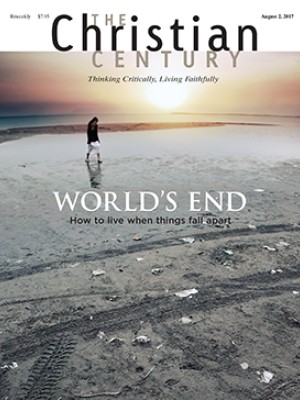George Carey quits honorary role as Anglicans confront sex abuse scandal
Former archbishop of Canterbury George Carey stepped down from an honorary role after a report on child sexual abuse accused the Church of England of collusion under his leadership.
Carey resigned after current archbishop of Canterbury Justin Welby made the unprecedented decision to ask him to step aside from his post as honorary assistant bishop in the Diocese of Oxford, a position often given to retired senior clergy.
The resignation highlights how church institutions are shifting their focus to punishing church officials for their roles in covering up child sexual abuse by priests, even as some criticize them for not sufficiently addressing the needs of the victims.
Read our latest issue or browse back issues.
Carey was castigated in an independent review, published in late June, of the way the church had handled abuse by another bishop, Peter Ball. The study by Moira Gibb said that as archbishop of Canterbury, Carey failed to pass on information about Ball to the police. Further allegations against Ball led to his imprisonment in 2015. Gibb’s appraisal said the church “colluded” with the abuser “rather than seeking to help those he had harmed.”
The review also found that after Ball was convicted of gross indecency, Carey received several letters from families and individuals about the bishop’s behavior but failed to hand over six of the letters to police. Carey also neglected to put Ball on the so-called Lambeth List, which listed clergy about whom there was doubt over their suitability for ministry.
Ball served in prison for two years and six months after pleading guilty to offenses against 18 teenagers and young men from the 1970s to 1990s.
The report, called Abuse of Faith, commissioned by Welby after Ball’s conviction in 2015, highlights not only the way in which Ball abused boys for more than 20 years but also the extent to which the church did nothing to help his victims. Gibb described “the failure of the church to respond appropriately to his misconduct, again over a period of many years.”
The report also records how Carey did not stop Ball even after he had resigned as bishop of Gloucester following the gross indecency charge. The bishop continued to serve in ministry at 17 private schools.
“I believed Peter Ball’s protestations and gave too little credence to the vulnerable young boys behind those allegations,” Carey said.
Phil Johnson of MACSAS, an organization for survivors of clergy abuse, said, “The church and the establishment colluded in covering up Bishop Peter Ball’s offending at the highest level over very many years.”
Klaus Mertes, a German Jesuit who spoke at Oxford University late last year about the way the Catholic Church has dealt with child sexual abuse cases, has analyzed how church institutions have focused on their needs rather than those of the abused.
Mertes identified another common theme in church institutions—the way they often see themselves as victims—and he warned: “For the process between institution and victim it is important, first of all, that the representatives of the institution assume responsibility for their own failure—so that they certainly do not define themselves as victims, but admit to their systemic membership of the offenders’ side.”
Ball is not the only abusive priest in the Church of England. In England and Wales, both the Anglican and Catholic churches have set up systems to protect children from abusive priests and have acknowledged the hurt and damage done to those abused.
The Independent Inquiry into Child Sexual Abuse in England and Wales, convened by the British government, is examining abuse in the Church of England and the Catholic Church as part of a study that may take many years to complete. —Religion News Service
A version of this article, which was edited on July 14, appears in the August 2 print edition under the title “George Carey quits role as Anglicans confront sexual abuse scandal.”




